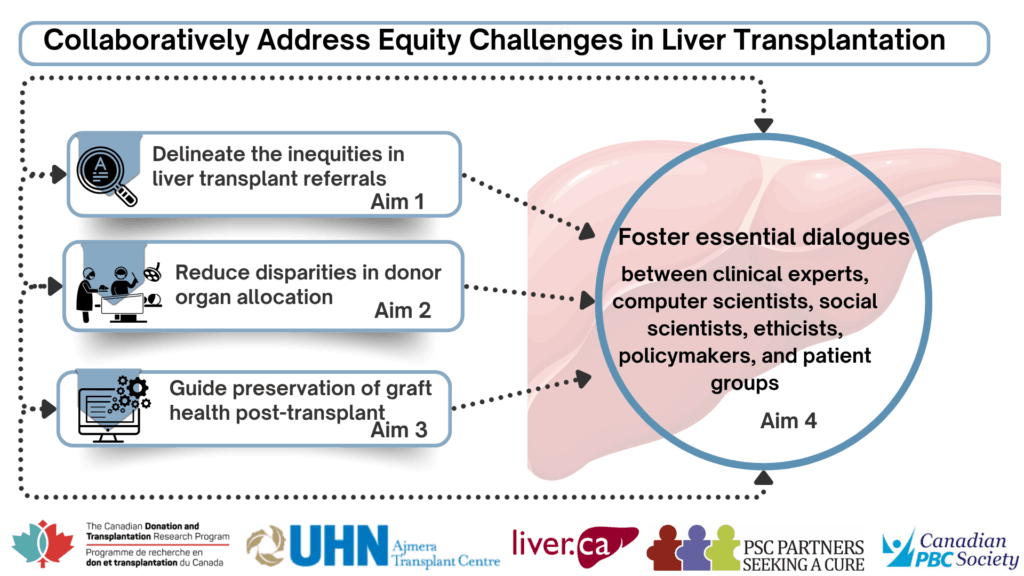Congratulations to Dr. Mamatha Bhat (CASL Research Committee Co-Chair) for leading a $2M CIHR-funded project as Nominated Principal Applicant — and to Dr. Jennifer Flemming (Guidelines Committee Chair) as Principal Applicant and co-lead of Aim 1.

Competition: CIHR Team Grant: Embracing Diversity to Achieve Precision & Health Equity/Subvention
Title: Team Liver AI – Building the Framework to Tackle the Inequities of Access to and Outcomes for People Needing Liver Transplant in Canada
Nominated principal applicant: Dr. Mamatha Bhat
Co-Principal Applicants: Dr. Jennifer Anne Flemming Dr. Patricia Gongal, Prof. Rahul Gopalkrishnan Dr. Divya Sharma
Co-Applicants: Dr. S. Berkhout, Dr. R. Bhanji, Prof. M. Brudno, Dr. D. Chahal, Dr. P. Chaudhury, Dr. S. Congly, Dr. J. Feld, Mr. J. Gross, Prof. G. Hirschfield, Mrs. S. Holdsworth Dr. G. Huard, Mrs. S. Jha, Dr. M. Khan, Dr. S. Naimimohasses, Ms. S. Raju, Dr. M. Selzner, Dr. A. Shaheen, Ms. M. Vyas, Ms. G. Wright, Mx. J. Zhao, Dr. X. Zhao, Dr. J. Zhu, Dr. E. Ziegler
Summary of Research Proposal
Chronic liver disease impacts over three million Canadians, with over 5,000 Canadians succumbing annually to end-stage liver disease. Liver transplantation (LT) represents a vital, life-saving treatment for end-stage liver disease. However, liver transplantation access and outcomes are in urgent need of reform given deep-rooted barriers to equitable care. A transformative approach is essential to dismantle the health and social inequities that hinder fair and just outcomes for all. Innovation through technologies such as artificial intelligence (AI) is both exciting to advance clinical care but also as a vehicle to address health care inequalities; equally, there is a need to build trust for engagement of physician and patient stakeholders.
In this Team Grant, we will address the critical challenges of equity along the liver transplant (LT) patient journey in Canada using advanced models and precision approaches that arise from cutting-edge AI; in so doing, providing an equitable and inclusive platform that will optimize patient outcomes. We will:
- Delineate disparities in referral for liver transplantation across Canada (Aim 1).
- Develop a model to ensure fair and equitable organ allocation for patients on the liver transplant waitlist (Aim 2).
- Develop a predictive model to guide preservation of graft health post-transplant, integrating medical and socioeconomic determinants of health (Aim 3).
- Collaboratively address equity challenges in liver transplantation through national critical dialogues (Aim 4).
Our diverse national team—comprising physicians, computational scientists, ethicists, nurses and deeply committed patient partners—is united in the mission to build a sustainable, nationwide framework towards more equitable access to liver transplant referrals and organ offers for waitlisted patients, while optimizing posttransplant outcomes for all recipients.
To map the current landscape of referrals to LT programs, we will analyze data on the prevalence of end-stage liver disease in Canada, correlating it with the number of referrals and transplants across sex, race/ethnicity, and social determinants of health (Aim 1). To address the profound inequities in organ allocation, our multidisciplinary team will develop a statistical model to predict each patient’s likelihood of receiving donor offers, enabling us to propose targeted strategies for more equitable organ distribution (Aim 2). Grounded in an intersectional understanding of health disparities, which conceptualizes social categories of difference as interacting and mutually informative, our reflexive and iterative approach to collecting and analyzing data works to ensure that every patient has an equitable opportunity to receive a transplant.
To improve long-term outcomes, we will harness AI to identify and mitigate racial, ethnic and socioeconomic disparities in post-transplant health (Aim 3).To build and foster deeper community trust and understanding of AI, we will establish national forums designed for open, multi-directional dialogues. These forums will empower research teams to create equitable and trustworthy systems (Aim 4). By examining the ethical and political challenges surrounding data collection, data analysis, access, and the use of AI, we will address the key factors that influence the successful implementation of these tools in advancing health equity. Through these critical conversations, we will drive inclusive and reflexive approaches to data and AI tool development, ensuring that all stakeholders are engaged in building effective and trusted solutions.
We will leverage Project ECHO as an existing, effective infrastructure for knowledge dissemination and outreach to remote healthcare workers who both refer and co-manage patients with liver disease. Our collaborators with roles in professional societies and government agencies will facilitate presentations to policymakers and build support for the implementation of our novel organ allocation model. The Canadian PBC Society, PSC Partners, the Canadian Donation and Transplantation Research Program and Liver Canada will support our community engagement and knowledge mobilization. Through our cross-country interdisciplinary team, we will develop clinical decision tools powered by diverse data to promote equity in transplant referrals and organ allocation, while optimizing long-term health outcomes for all Canadians affected by liver disease.
Get Involved
If you would like to learn more about the project or participate in our national forums, please get in touch with Ms. Katie Bain, project manager (katie.bain@cdtrp.ca)
